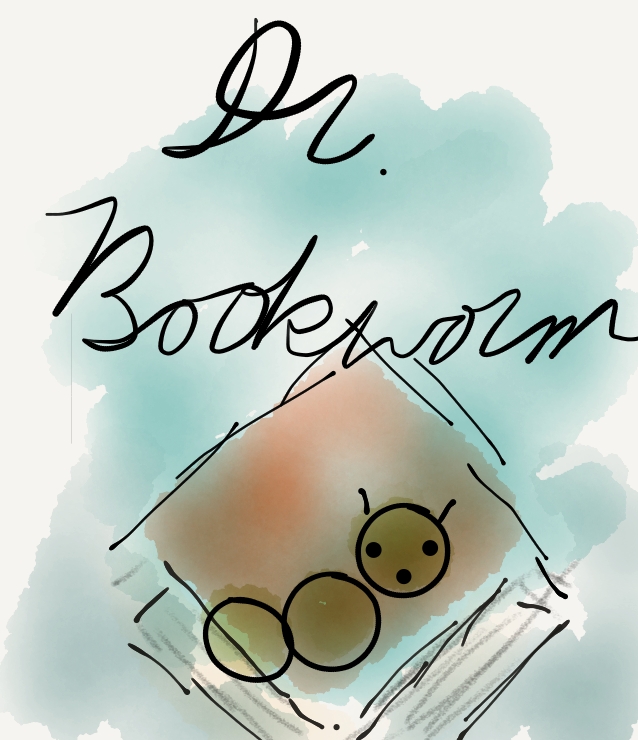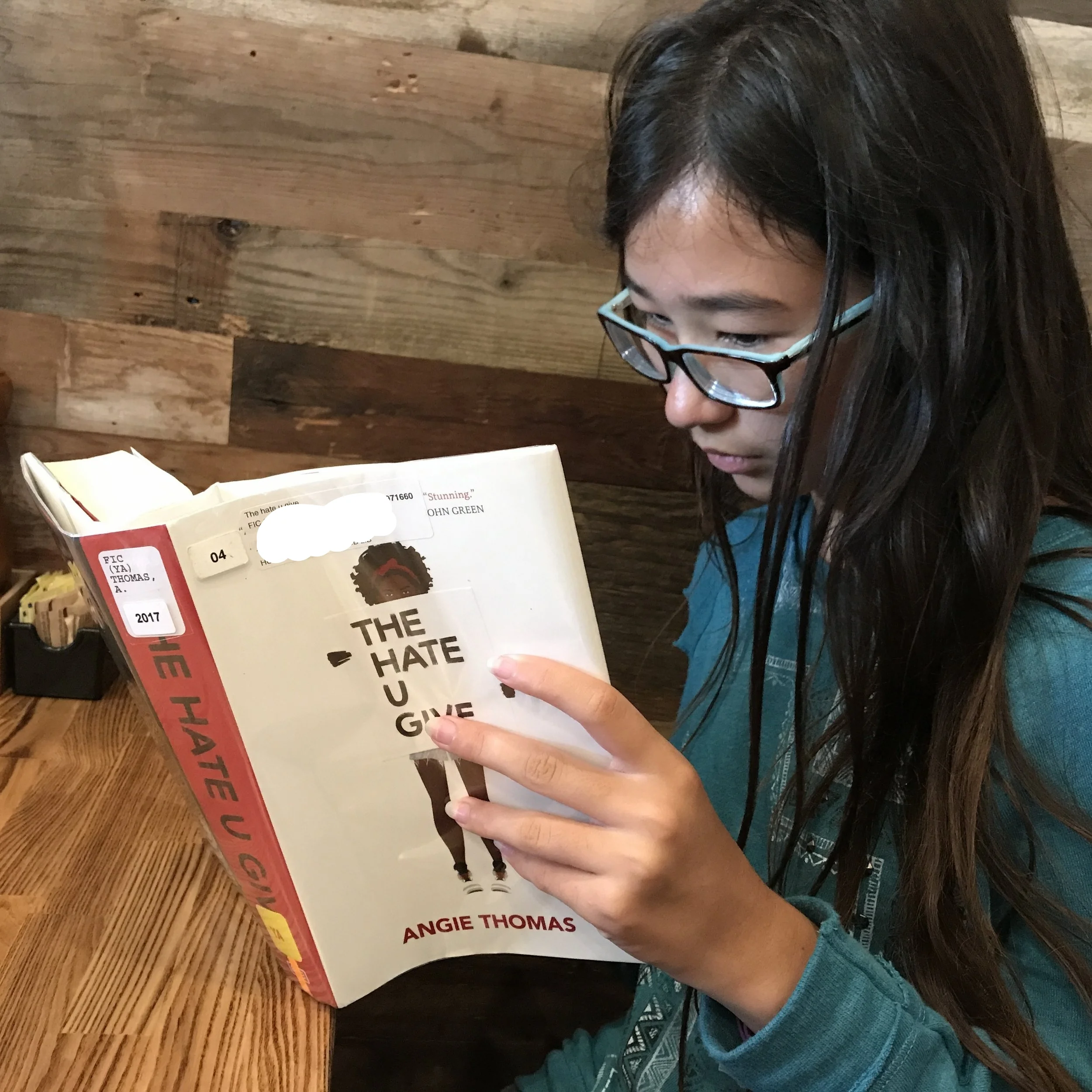The Hate U Give Read-Along, Part 1
Surprisingly I had a tough time getting people to join me in this read-along--maybe even tougher than I did with Twilight. It's surprising because The Hate U Give has been in the top ten of YA books for a while now. In fact, it's held the number one position for many weeks. It's not surprising, on the other hand, because of the tough subject matter. Maybe I'm 'selling' it wrong.
For me, the intrigue about this book was not necessarily about the Black Lives Matter movement or to see how Thomas would handle the after math of Khalil's shooting. What first piqued my interest was Starr's discussion of her own dichotomy of worlds--navigating the community that she grew up in and lives in versus the elite private school she attends. It's not just about race and ethnicity--it's also about economics. And while I'm the first to admit that I grew up in a world where I never wanted for food or shelter or love, I also have worked for more than a decade among an underserved population, similar to the neighborhood in which Starr lives.
While I first read THUG in August, I re-read it for the read-along. Unfortunately, there was a shooting nearby that just happened recently (Sept 22). I'm not sure what to think about it. It was a cop against an unarmed person that was first reported to be a teen. There were many mixed details at first and I'm sure many of you have heard about the shooting by now. Or maybe you even watched the video. I don't recommend it. It still haunts me.
I also regret reading comments about the death of this person. And whether or not you think the cop was justified....it's still a hard topic. There is still someone dead at the end of the day.
Here's the thing: there are no protests on my streets. And that makes me both sad and happy.
Back to The Hate U Give, Angie Thomas handles the controversial shooting with a delicate balance of a novel point of view--from the unarmed teen's best friend, who happens to be the only witness. She also happens to be the only surviving member of her childhood trio of friends, dubbed The Hood Trio and 'tighter than the the inside of Voldemort's nose'. Yes, at age 16, Starr has seen TWO of her friends killed by gunfire.
Thomas shows how Starr navigates through the multi-sided fall-out from Khalil's death, through what he means to her, and what these gun shootings mean to her community. Throughout, Thomas also weaves various bits of pop culture throughout--referencing The Fresh Prince of Bel-Air, Harry Potter and the fact that Starr and her older brother, Seven are Slytherin because all those kids are rich, Tupac, Drake and more. What Angie Thomas does so well is she makes the reader feel like they are walking in Starr's shoes. I feel her fear, I feel her anger, and I feel her grief. I was so pulled into the story, even the hard parts, and it's all difficult to contemplate.
Like I mentioned above, I worked for a long time with a lot of kids who are in similar situations--struggling against parents who have to work multiple jobs, struggling to make it to be the first ones in their family to go to college, struggling sometimes just to find a safe space to play outside. And like the community of Garden Heights in THUG, these families have so much heart. This is what struck me the most about the novel overall--not the riots and the gangs, but the sense of COMMUNITY throughout, the sense of a larger village reaching out to take care of one another.
Ever wonder what your doctor's desk looks like? This is my view. In between patients if there is downtime or during lunch or after hours, I'm either calling back parents or checking on labs. Or reading--medical magazines or fiction. Feature photo up top of Mini Me re-reading THUG. Posted with permission.
Some of my takeaway from the first half of the book (we'll discuss Part 1 here up to page 278 and Parts 2-5 in the next post):
- the actual shooting is hard to read the first and second times. Okay, EVERY time. I don't ever want to be in that situation.
- I didn't realize the first time I read through just how young Starr's dad is--he's only 36!
- I connected so much with Lisa, Starr's mom, who is a nurse in a community clinic.
- Starr's dad--I love how he supports Starr every step of the way, Starr calls his tattoos of her and her siblings, "Love letters in the simplest form" (p. 37)
- I can't imagine how Starr could go back to school, having to act as if nothing has happened
- The interrogation of Starr (p 93-104)--how quickly it turned into a 'justification' for the shooting. It happens more times than not, I'm sure, but we as the reader know that Khalil was innocent, checking in on Starr, and gets shot anyway. This is the part that kills me--the part that you know will direct the rest of the book. The part that I have a hard time when I read about that recent shooting nearby. (I can't even get into the Vegas events right now....) If Starr had been killed too, what would the media be saying about her?
- Starr's friendships at school--I wanted so badly for Hailey to pull it together, but I could see why Angie Thomas would depict her that way because I see certain privileges in the private school that my girls attend too. Certainly not from most people, but I could see how Hailey's world is only shaped by her world of privilege. She doesn't see any other way because she's never been questioned or challenged or wanted for anything. But more importantly, she hasn't been taught differently either. My hope? Is that someday when she's older, the fictional Hailey will realize her mistakes.
- The dichotomy between Starr's dad (Big Mav) and Uncle Carlos, who is a father figure to Starr and her siblings not just during Big Mav's prison sentence, but even beyond. I love that Thomas creates two very strong (though contrasting) and loving black male characters. Of course the fact that her uncle is a cop also does force the reader (and Starr) to see things from a different point of view. It's brilliant storytelling. And, in case you haven't heard, they are currently filming THUG and Common is playing Uncle Carlos with Russell Hornsby as Starr's dad.
- The riots: I can't imagine how Starr's family felt when machine guns (and tanks!) start tearing through their neighborhood--I cant even focus on it now after the events in Vegas this week. Going to skip ahead.
- Devante--I wasn't sure where Thomas was headed with him. But in the end, I feel like the Carter family helped Devante the way they could have helped Khalil had he come to them. There's no way that Big Mav was going to let Devante get sucked into the world he was once in. And the thing is, it doesn't take long before you realize that he lost his brother too during the night that Khalil was killed. There's so much needless loss of life.
- The school protest: how annoying that people used Khalil's death as an excuse to miss school. I had so much respect for Chris and Maya and the other things that anti-protested. I'd like to think that that sort of thing doesn't happen, but I'm sure it does.
- Ugh, was anyone as angry as I was at the way the police treat Starr's dad?! (p. 192)
Crazy lighting effects of me while reading The Hate U Give at The Standard in downtown LA. Yes, I brought 'homework' during my sisters weekend away.
Tell Dr. Bookworm! What was your takeaway from the first half of THUG?
Were you shocked about the shooting? Were you surprised that Starr pretended she didn't know Khalil at first?
What did you think about Starr's interrogation and how the police treat her? How might it have been different if she didn't have a well-respected uncle as a cop too?
The incidents with Starr and her friends at school--man, I can't even get started. There are so many little things that was said to me growing up in a mostly white private school too, especially in the 1980s. Many were not mean-spirited necessarily, but born out of ignorance. That's why I shut things down immediately when I hear about things from my girls (which is not often). On the other hand, I don't think I really understood any of it until I was older or at least in my 20s. For example, I was miffed when one of my Korean-American friends explained to me in the late 80s/early 90s why we as a people should not be called 'oriental'. I get it now. On the same token, Mr. Bookworm prefers to be called 'white' rather than Caucasian because he is not Caucasian. What do you think about Hailey's words and actions? And Maya? What about Chris?
I can see why Angie Thomas starts the novel out with Starr's lesson on how to act around a cop from the get-go. These are lessons you never want to have to teach your kids, but I can see why Starr's parents emphasize it. And how humiliated Big Mav must feel having to get down on the ground by order of the cops in front of his kids. (p 192) Any thoughts on how the cops treated Big Mav? Or Khalil?
Any other takeaway points or comments on my own takeaway from above?
Let us know in the comments. I know that these are controversial topics so I just ask you to please be respectful. Feel free to tell me in person or via PM or email or the comments below. I'd love to hear what your thoughts are on THUG.








